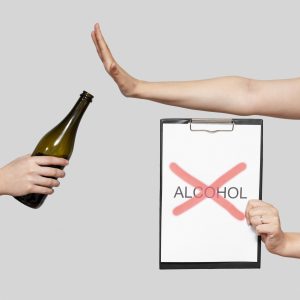“Breaking the Chains: Overcoming Alcoholism Through Support and Self-Care”
Once there was a man named Sunil (Name changed), who had struggled with alcoholism for many years. Sunil had a successful career and a loving family, but his drinking had taken a toll on his health, his relationships, and his life in general.

One day, Sunil woke up feeling sick and exhausted. He had missed several days of work, and his wife and children were becoming increasingly worried about his drinking. That’s when Sunil realized he needed help.
Sunil reached out to a medical professional who specialized in addiction treatment. He underwent a physical examination and was diagnosed with alcohol use disorder. The doctor recommended a treatment plan that included medication, therapy, and support groups.
At first, Sunil was resistant to the idea of seeking help, but he knew he needed to make a change. He started attending therapy sessions and began taking medication to manage his cravings. He also joined a local support group, where he met other people who were struggling with alcoholism.
With the support of his family, his doctor, and his support group, Sunil began to make progress in his recovery. He started to feel better physically and mentally, and he began to rebuild his relationships with his loved ones. He also found new hobbies and interests to fill his time, such as hiking and painting.
Over time, Sunil’s drinking became less and less of a problem. He eventually stopped drinking altogether and remained committed to his recovery. He continued to attend support group meetings and therapy sessions, and he even became a mentor to others who were struggling with addiction.
Sunil’s journey to recovery was not easy, but he proved that it is possible to overcome alcoholism with the right support, dedication, and hard work. He learned that there is no shame in seeking help and that recovery is a process that requires patience and persistence.
Ways to handle alcoholism
Handling alcoholism is a complex and challenging process that requires a comprehensive approach. Here are some steps that can be taken to address alcoholism:
- Acknowledge the problem: The first step in handling alcoholism is acknowledging that there is a problem. Encourage the person to seek professional help and support.
- Seek professional help: Encourage the person to seek professional help from a medical professional, addiction specialist, or therapist. A medical professional can provide a physical examination and recommend treatment options, while an addiction specialist can provide counseling and support.
- Support and encouragement: Offer support and encouragement to the person. Let them know that you are there for them and will support them through their recovery process.
- Avoid triggers: Help the person avoid situations or triggers that may lead to alcohol use, such as social events where alcohol is present.
- Consider medication: Medications such as naltrexone and acamprosate can be used to reduce alcohol cravings and help the person maintain sobriety.
- Attend support groups: Encourage the person to attend support groups such as Alcoholics Anonymous or SMART Recovery, where they can connect with others who are going through similar experiences.
- Practice self-care: It’s important for both the person struggling with alcoholism and their loved ones to practice self-care. This may include exercise, healthy eating, meditation, and therapy.
- Stay positive: Recovery from alcoholism is a long and challenging journey. Stay positive and encourage the person to continue seeking help and support.
How to stop relapse?
Stopping a relapse from occurring can be challenging, but there are several steps that can be taken to help prevent a relapse:
- Identify triggers: Identify the situations or events that may trigger the urge to use alcohol or drugs. Common triggers include stress, anxiety, boredom, loneliness, and social pressure.
- Develop coping strategies: Develop healthy coping strategies that can be used to manage triggers. This may include meditation, exercise, deep breathing, talking to a friend, or engaging in a hobby.
- Attend support groups: Attend support groups such as Alcoholics Anonymous or SMART Recovery, where you can connect with others who are going through similar experiences. Support groups can provide a sense of community and accountability, which can be helpful in preventing relapse.
- Avoid high-risk situations: Avoid situations that may increase the risk of relapse, such as parties where alcohol or drugs are present, or spending time with friends who use drugs or alcohol.
- Practice self-care: Practice self-care by getting enough sleep, eating healthy, exercising, and engaging in activities that bring joy and fulfillment.
- Continue therapy: Continue therapy or counseling to address underlying issues that may contribute to addiction, such as trauma or mental health issues.
- Develop a relapse prevention plan: Develop a relapse prevention plan that includes strategies for dealing with triggers, coping skills, and support resources. Review the plan regularly and update it as needed.
Remember, relapse is a common part of addiction recovery, and it doesn’t mean that you have failed. If a relapse does occur, seek help immediately and remember to be kind to yourself. Recovery is a journey, and it takes time, effort, and dedication to maintain sobriety.


i agree with your opinion. but now the percentage of youth using drugs are increasing day by day. to reduce the usage of drugs youths want awareness classes and counselling .in my opinion renai medicity have the best counselling department with good medical experts
My story was also similar, thanks to peer support group and doctors I have completely stopped drinking.